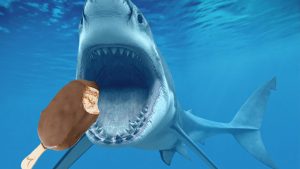Home » Commentary » Opinion » Do ice cream sales increase shark attacks?
· Ideas@TheCentre
 Labor MP Andrew Leigh’s study on data around effective company tax rates and employment shows incomplete analysis that mistakes correlation for causation.
Labor MP Andrew Leigh’s study on data around effective company tax rates and employment shows incomplete analysis that mistakes correlation for causation.
But a correlation does not mean it’s a cause. For example, as ice cream sales increase, there is a correlation in the increased rate of shark attacks. However, the rise in shark attacks is not caused by ice cream sales, but by the unstated factor of warm weather sending more people to the beach.
Mr Leigh’s paper says higher effective company tax rates are correlated with companies hiring more workers. But common sense suggests it is highly unlikely that higher company taxes cause companies to hire more workers.
Clearly other unstated factors are at play. A plausible one is that more profitable firms tend to have higher effective company tax rates, but if they are focused on growth will generally need more workers. Hencer, these firms are more likely to hire new staff for reasons that have nothing to do with company tax rates.
And this is the problem with incomplete analysis, you can tell very different stories by making a few leaps of logic.
To provide another illustration of how incomplete analysis can create varying conclusions let’s add the following economically defensible assumption to Mr Leigh’s analysis: the marginal deadweight cost of company tax is higher, the higher is the level of the tax. That is, reducing a company’s tax rate from 30% to 29% is more beneficial to new investment than reducing a company’s tax rate from 20% to 19%.
So what can we conclude from our new story? Companies paying higher tax rates hire more workers. Companies with higher tax rates get more benefit from a tax cut. Ergo sum, the company tax cut is actually more beneficial to employment than even the Liberal Party is currently claiming.
Do ice cream sales increase shark attacks?